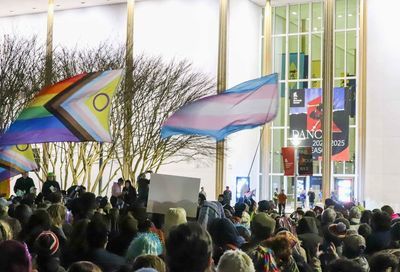”LGBT.” The ”T” is silent.
No sooner did the gavel make contact with the podium repealing DADT than our national organizations were talking up marriage equality as the next big thing. David Brock, founder of the new organization Equality Matters, said, ”But we believe the big battle is full equality, which is gay marriage.” Fred Sainz, speaking for the Human Rights Campaign, was ebullient on marriage. Donor and activist listservs were all gaga over marriage.
 Dana Beyer (Photo by Todd Franson)
Dana Beyer (Photo by Todd Franson)
What happened to ENDA?
This was strange, since after talking to then-Speaker Nancy Pelosi (D-Calif.) a number of colleagues said she was perplexed as to why the national LGBT leadership had abandoned ENDA in favor of DADT repeal. Congressional leadership hadn’t asked for a change. The whip counts showed more support for ENDA than for DADT repeal. It seems that getting the last few votes for ENDA could have been no harder than getting DADT repeal at the 11th hour.
So if not Congress, the obstacle had to be LGBT leadership. I will say upfront and from personal experience that I don’t believe any of our leaders personally desire to leave anyone behind. But just as full equality for everyone is my personal priority – exemplified in the first Dallas Principle, ”Full civil rights for lesbian, gay, bisexual and transgender individuals must be enacted now. Delays and excuses are no longer acceptable” – so I now believe that for many gay leaders, civil rights for all is not their priority. Rights for the relatively few gay people who want to serve in the military or get married are more important than the basic rights of the entire LGBT community to employment, housing and public accommodations. The same dynamic has been evident in a number of states, such as New York and Maryland.
Why does the ”T” in LGBT again seem to stand for ”token”? Historically the gender non-conforming, such as trans persons, drag queens and butch women, were relegated to the sidelines, as they weren’t passable in a bourgeois sense. There was thought to be no way the movement could succeed with ”regular Americans” if its representatives were seen as strange. It was easier to have buff men and femme women in thousand-dollar suits do the work and carry everyone else along for the ride.
Most Americans viewed gay people simply through the lens of their sexual relationships until recently, when they’ve finally been seen as complete human beings. It has made all the difference, feeding the drive for acceptance into the all-American triptych of the military, marriage and motherhood.
Perceptions have yet to change as extensively for gender non-conforming people, leaving us viewed through a lens of sexual and mental pathology. That, in turn, makes it harder for our passable gay allies to fight the battle for gender identity and expression protections with us. They seem to fear being tainted by association with us, their discomfort making them poor lobbyists for the cause. I’ve seen this happen too often, both in Maryland and D.C., and my colleagues report similar experiences elsewhere. We need them to overcome that fear and represent us all, or step aside.
Ironically, the man who did the most to derail an inclusive ENDA in 2007 led the efforts to educate himself and his colleagues about the trans experience, and worked hardest on its behalf this past session. Congressman Barney Frank (D-Mass.) made the effort to become comfortable with trans people, exemplified by his hiring of Diego Sanchez. If only our community leaders did the same. It would be refreshing to see trans people leading national organizations. It would also be bracing to hear gay leaders speak passionately for full civil rights for trans and gender non-conforming individuals. Where there is silence, there is, naturally, the inference that the issue is of little importance.
To move forward, I echo Tom Carpenters’s call for an independent debriefing on our advocacy during this past congressional session. We must learn from the past, and do so quickly.
Dr. Dana Beyer, a retired eye surgeon is an author of The Dallas Principles. She is former vice president of Equality Maryland.






















